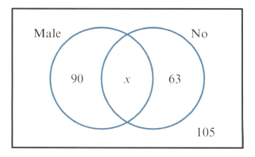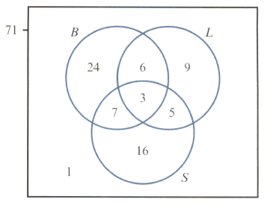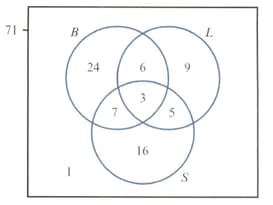Three boxes, and , each contain orange balls and blue balls, as shown.

A boy randomly selects one ball from each box. Given that he selects exactly one blue ball, find the probability that it is from box .


Important Questions on Probability
Two ordinary fair dice are rolled.
Event is 'the sum of the numbers rolled is or '
Event is 'the absolute difference between the numbers rolled is or '.
When the dice are rolled, they show a and a . Explain why this result shows that events and are not mutually exclusive.
Two ordinary fair dice are rolled.
Event is 'the sum of the numbers rolled is or '
Event is 'the absolute difference between the numbers rolled is or '.
Explain how you know that .
Two ordinary fair dice are rolled.
Event is 'the sum of the numbers rolled is or '
Event is 'the absolute difference between the numbers rolled is or '.
Determine whether events and are independent.
In a survey, adults were asked to answer yes or no to the question 'Do you regularly watch the evening TV news?' Some of the results from the survey are detailed in the Venn diagram opposite.
One adult is selected at random and it is found that the events 'a female is selected' and 'a person who regularly watches the evening TV news is selected' are independent. Find the number of adults questioned in the survey.

Bookings made at a hotel include a room plus any meal combination of breakfast , lunch and supper . The Venn diagram opposite shows the number of each type of booking made by guests on Friday.

A guest who has not booked all three meals is selected at random. Find the probability that this guest:
has booked breakfast or supper
Bookings made at a hotel include a room plus any meal combination of breakfast , lunch and supper . The Venn diagram opposite shows the number of each type of booking made by guests on Friday.

A guest who has not booked all three meals is selected at random. Find the probability that this guest:
has not booked supper, given that they have booked lunch.
